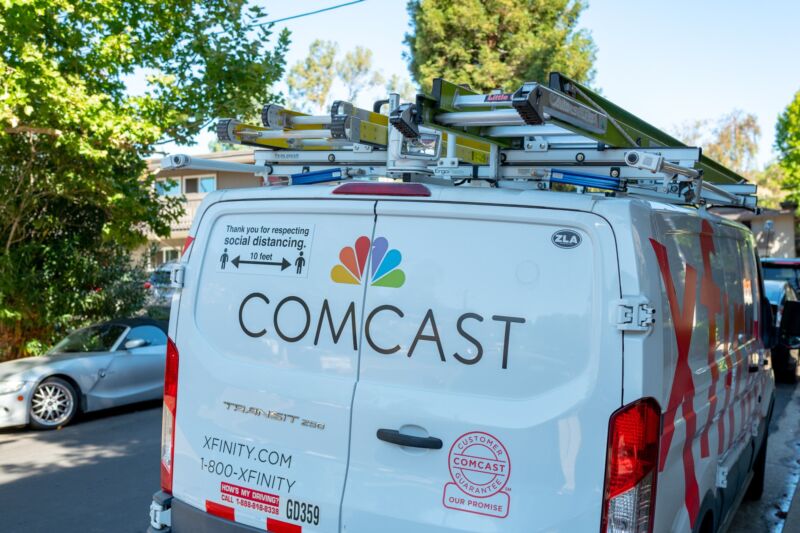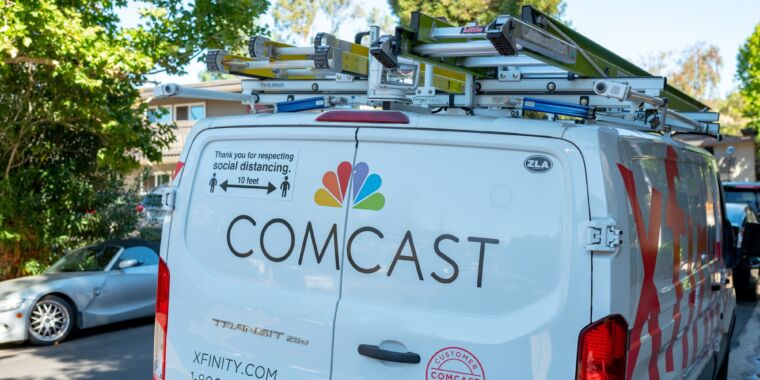
Getty Images | Smith Collection/Gado
The Comcast “Broadcast TV” fee that isn’t included in the company’s advertised prices is rising again, tacking as much as $27 onto the monthly bills of cable TV users. Comcast’s Broadcast TV and Regional Sports Network fees combined could add nearly $40 to a customer’s monthly TV bill after next month’s price hikes, all while Comcast advertises much lower prices than people actually pay.
“Comcast has started notifying customers and municipalities that it plans to raise video and Internet prices next month, including a whopping $7.35 a month increase for the Broadcast TV fee in one town,” a TV Answer Man article said on Saturday. The $7.35-per-month increase is in Taunton, Massachusetts, where Comcast said the Broadcast TV fee will rise from $18.65 to $26.
The Broadcast TV fee is rising from $24.95 a month to $27.25 a month starting on December 20 in Sandown, New Hampshire, a letter from Comcast to town government officials said. In Sandown, the Regional Sports Network fee is rising from $11.85 to $12.
The TV Answer Man report also said several towns in Michigan were “alerted that the Broadcast Fee will rise from $14.80 to $20.70 a month while the monthly Regional Sports fee will go from $9.50 to $10.15.” These are just a few examples as Comcast is raising prices nationwide.
The Broadcast TV charges added to customer bills vary by region. Comcast says the fees are based on the amounts that “broadcast stations charge us to carry them on our cable systems.” It’s true that Comcast has to pay retransmission consent fees to carry the stations, even though stations can be accessed for free over the air with an antenna. But the sneaky manner in which Comcast and other cable companies pass those costs on to customers can lead to bill shock and unexpected price increases.
Comcast’s advertised prices do not include the Broadcast TV or the Regional Sports Network fees even though these fees account for a large portion of customers’ actual monthly bills. On Comcast’s ordering website, the base prices are listed along with a message stating that Broadcast TV and Regional Sports fees are “extra” and that the price is “subject to change.” The Broadcast TV and Regional Sports fees also aren’t included in how Comcast calculates promotional pricing and thus can be raised even when a customer’s promotional rate hasn’t expired.
Comcast defends price hikes
Comcast said in the letter to town officials in Sandown that “rising programming costs, most notably for broadcast TV and sports, continue to be the biggest factors driving price increases. While we absorb some of these costs, these fee increases affect service pricing.”
Comcast is also raising the base prices of monthly service plans and issued a statement saying the average increase nationwide is 3.8 percent. A Comcast spokesperson told Ars the 3.8 percent figure includes all the residential services—TV, Internet, and phone lines. But Comcast said there are no increases in phone prices, so the average TV and Internet price hikes would be higher than 3.8 percent.
Comcast’s statement on the price increases blamed the rising cost of video programming but said the overall increases are lower than the most recent inflation rate:
TV networks and other video programmers continue to raise their prices, with broadcast television and sports being the biggest drivers of increases in customers’ bills. We’re continuing to work hard to manage these costs for our customers while investing in our broadband network to provide the best, most reliable Internet service in the country and to give our customers more low-cost choices in video and connectivity so they can find a package that fits their lifestyle and budget. Our national average increase of 3.8 percent is about half of the most recent rate of inflation.
A Comcast spokesperson also noted that “the rest of the industry is not immune from the rising costs charged by programmers as most of today’s popular streamers have taken recent price increases as well.” But compared to Comcast, streaming services’ advertised rates are generally closer to the actual prices their customers pay.
The letter to Sandown officials listed increases to base monthly rates for TV and Internet service and hikes to several fees in addition to the Broadcast TV and Regional Sports ones. TV box fees are set to rise from $8.50 to $10 a month, modem rentals from $14 to $15 a month, and in-home service visits from $70 to $100, the letter said.
Charter raised Broadcast TV fee to $21
We’ve written about Comcast’s ever-increasing Broadcast TV and Regional Sports Network fees numerous times over the years. We’ve written similar articles about cable giant Charter Communications raising its Broadcast TV fee and other rates, though Charter doesn’t impose a Regional Sports Network fee.
Charter raised prices on Spectrum home Internet service by $5 earlier this month, bringing its standalone broadband prices to $79.99 a month for 300Mbps download speeds, $99.99 a month for 500Mbps, and $119.99 a month for 1Gbps. Charter also raised its Broadcast TV fee in March from $18 to $21 a month.
Disclosure: The Advance/Newhouse Partnership, which owns 12.4 percent of Charter, is part of Advance Publications. Advance Publications owns Condé Nast, which owns Ars Technica.








